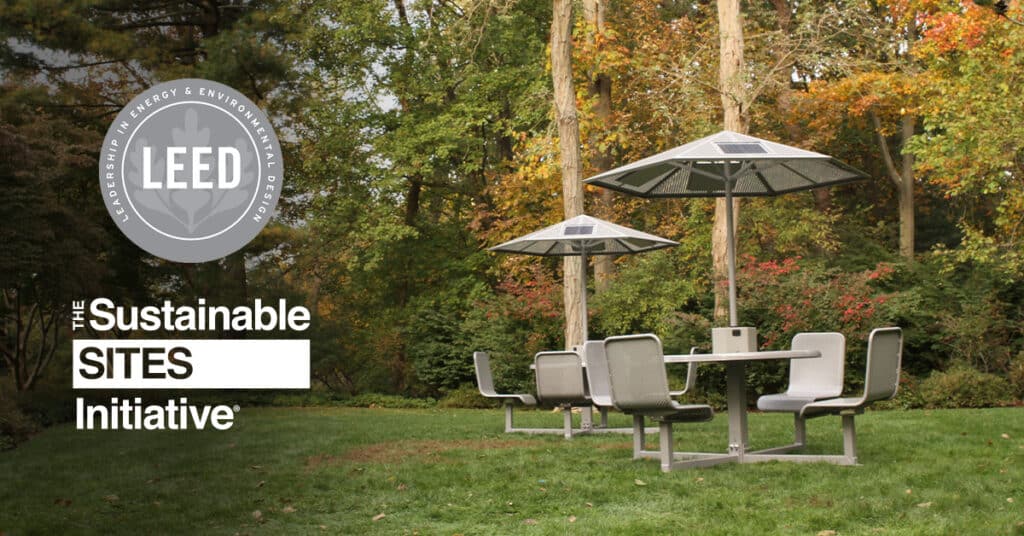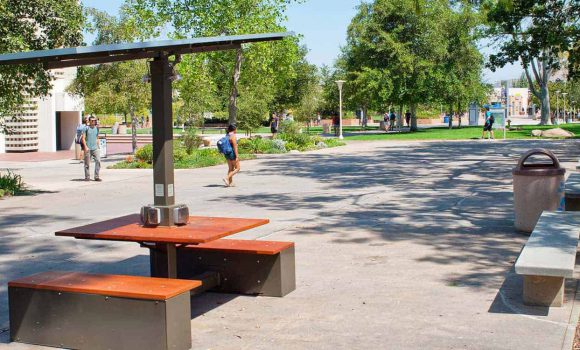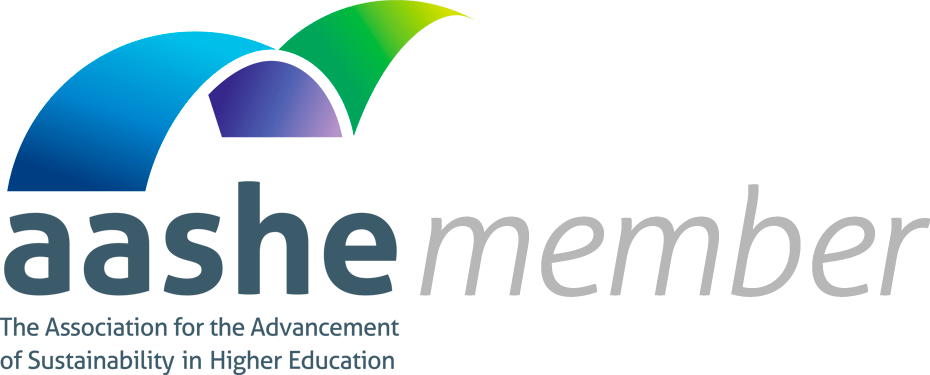SITES is a rating system that provides a comprehensive framework for sustainable land design and development. This program administers practical and measurable strategies for land design, construction, operations and maintenance of outdoor landscapes.
These spaces include various parks and gardens, commercial outdoor spaces, corporate campuses, community areas, and university campuses.
SITES rating system is based on a 200-point system consisting of 18 prerequisites and 48 credits with four certification levels (Platinum, Gold, Silver, Certified). There are ten sections under this rating system.
SITES rating system works in synergy with LEED (Leadership in Energy and Environmental Design). While LEED is the green building rating system, SITES is a rating system that guides implementation of sustainable design to the open outdoor spaces other than buildings.
Earning credit towards either SITES or LEED automatically means earning corresponding credit towards the other.
Sunbolt product portfolio can help in earning points towards SITES credits under specific categories.
SITES Categories
Section 4: Site Design – Soil + Vegetation
C4.9 Reduce urban heat island effects
Intent of this credit is to minimize urban heat island effect on microclimate and human and wildlife habitat. Heat island effect is a phenomenon caused due to absorption of heat by dark, non-reflective surfaces and its radiation to surrounding areas. One of the required solutions to curb this effect involves use of vegetation and reflective surfaces on the site.
For example, providing shade with structures covered by energy generation systems that produce renewable energy such as solar thermal heaters, photovoltaics, and wind turbines. Sunbolt workstations with large canopy can qualify as an energy generating shade structure on site.
Section 6: Site Design – Human health + Well-being
C6.6 Support Social Connection
This credit point intends to strengthen community and encourage social interactions by providing outdoor spaces for people to support gathering, eating, working, and playing together.
Measures include providing seating spaces, amenities and activity spaces to accommodate moderate to large groups of people. Sunbolt workstations and carousels can be added to outdoor sites like parks and educational campuses to bring people together for social interactions.
Section 8: Operations + Maintenance
C8.6 Use renewable sources for landscape electricity needs
This credit motivates projects to reduce greenhouse gas emissions associated with site operations and minimise air pollution, habitat destruction, and pollution from fossil fuel-based energy production by supporting a renewable energy market.
One of the solutions is to install on-site renewable energy sources to generate outdoor site electricity for at least 50 or 100 percent of annual outdoor site electricity. Sunbolt workstations like CampusXL and Momentum, with their larger solar array and higher energy output, can help sites generating on site renewable energy.
Section 9: Education + Performance Monitoring
C9.1 Promote Sustainability awareness and education
Here, the intent is to promote understanding sustainability in ways that positively influence user behavior by interpreting on-site features and processes. Measures include providing educational or interpretive elements that draw attention to sustainable features of the site.
Sunbolt builds interactive workstations and units specific to educate people about sustainable solutions and encourage environmentally responsible behavior.
Sunbolt’s Solar Power System
Sunbolt Solar Workstations and charging solutions power productivity using the world’s most dependable resource, the sun. Designed and built with a quality and sustainability-first attitude, each product is made from architectural-grade, eco-friendly materials.
The large solar canopy qualifies as an energy generating shade structure, while producing up to 12kW a day of clean and renewable power.
These solar powered charging systems are equipped with advanced Maximum Power Point Tracking (MPPT) technology that monitors the solar output, a DC to AC inverter and a capacity of 500W allowing for seamless integration of solar power into the existing electrical infrastructure, minimizing energy loss.
Excess energy is stored in the two rechargeable 100ah Absorbed Glass Mat (AGM) batteries that will provide energy consumption when solar production may be low i.e., night, or cloudy days.
Social Connections
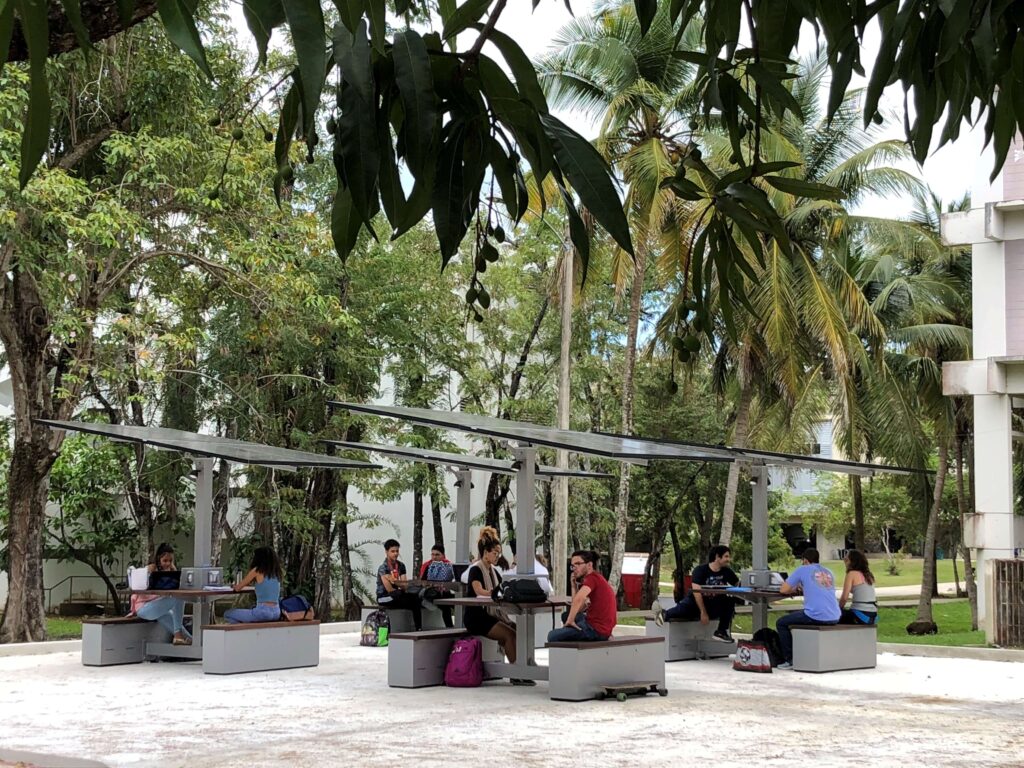
The outdoor solar powered furniture serves as a meeting place for community engagement and interaction. It provides an opportunity for students, employees, faculty, staff, and community members to come together and socialize while powering their mobile devices.
Outdoor settings create a relaxed and open atmosphere conducive to conversation, laughter, and bonding. The informality of outdoor spaces often facilitates more authentic and enjoyable social interactions.
Educational Value
The steadily advancing technology in Sunbolt’s solar charging tables make for an excellent educational tool, providing students with a firsthand experience in the realm of renewable energy.
It cultivates opportunities to teach principles of solar energy generation, creates a space for an in-depth environmental education, while observing energy conservation and direct sustainability.
SITES and LEED both require educational and community engagements that adopt a culture of sustainability. Sunbolt offers that and more with solar powered outdoor commercial furniture.
Performance Monitoring
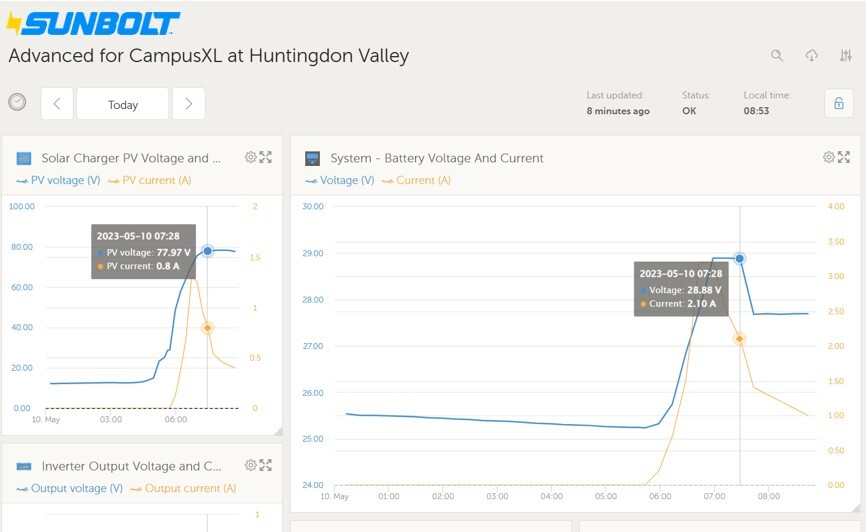
Sunbolt’s solar structures are each equipped with Bluetooth-enabled monitoring that provides the end user with live status information on what the unit is generating as well as outputting. This functionality tracks energy usage in real-time: by minute, hour, daily, or by the month.
Sunbolt also provides the option of remote monitoring where you can excess this data from anywhere in the world. These monitoring capabilities provide warnings for troubleshooting, identify statuses, and allow the recognition of behavioral patterns.
By monitoring these patterns, researchers can make educated decisions as it relates to energy efficiency measures, helping them meet energy performance targets that align with SITES and LEED certifications.
Research and Innovation
With the performance monitoring capabilities provided by the technology installed in Sunbolt’s solar powered systems, students and researchers can study the performance of solar panels. The arrangement and design of the solar workstations invite the opportunity to host workshops, seminars, and events that raise awareness of energy conservation and sustainability practices.
With the remote monitoring advantage, information can be downloaded in CSV or EXCEL files to compile data for up to one year. Reporting functionality is also available to calculate the amount of solar energy produced for the year.
Researchers can form scenarios, run analyses, test innovative technologies, and explore ways to optimize energy generation and storage.
Sustainability through renewable energy continues to be a priority for Sunbolt. The incorporation of solar power into a well-designed sustainable structure helps reduce reliance on fossil fuels and lowers greenhouse gas emissions while emphasizing a sustainable site design and energy efficiency.
Obtaining a solar powered workstation demonstrates commitment to maintaining balance and longevity in social, economic, and environmental systems.
This comprehensive solution aligns with the goals and requirements of SITES and LEED certifications with the generation of clean energy, educational aspects, research opportunities, and contribution to community engagement.
SOURCE: https://sustainablesites.org
